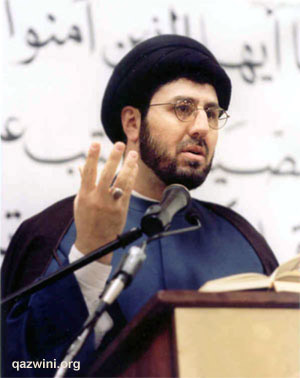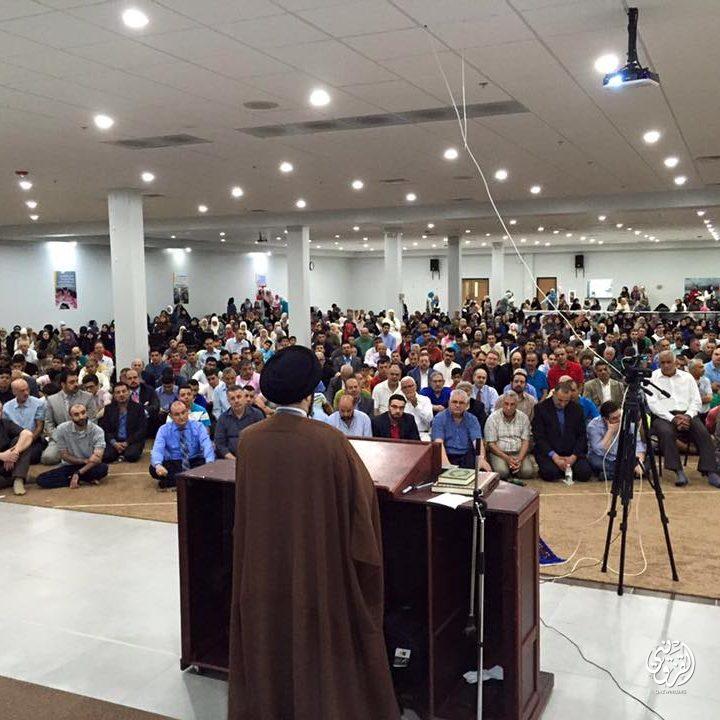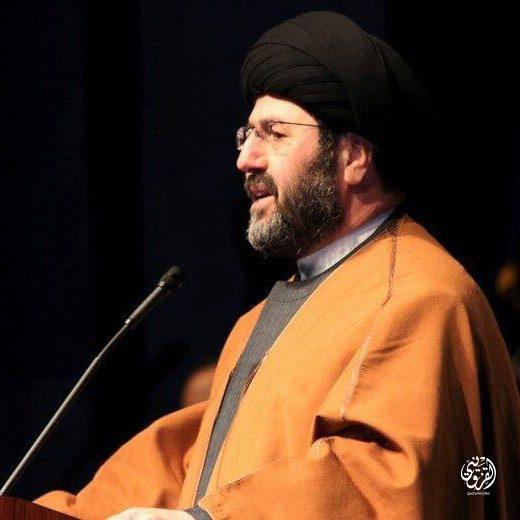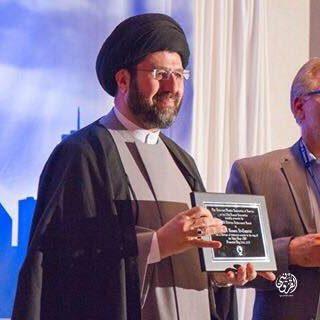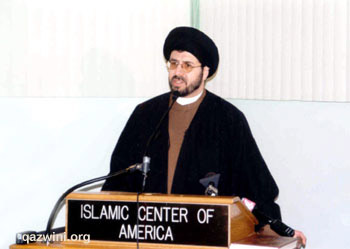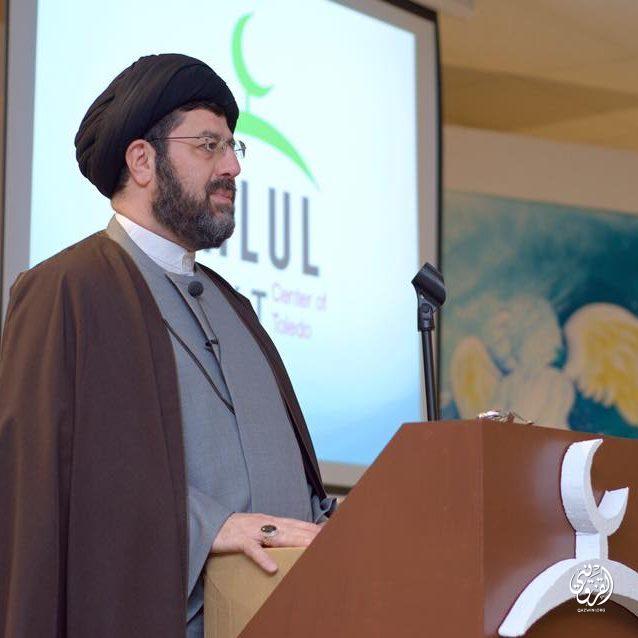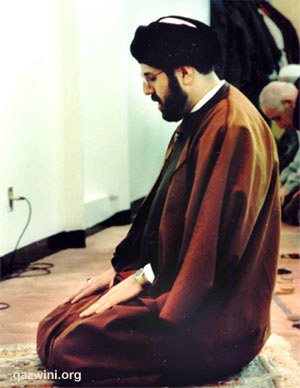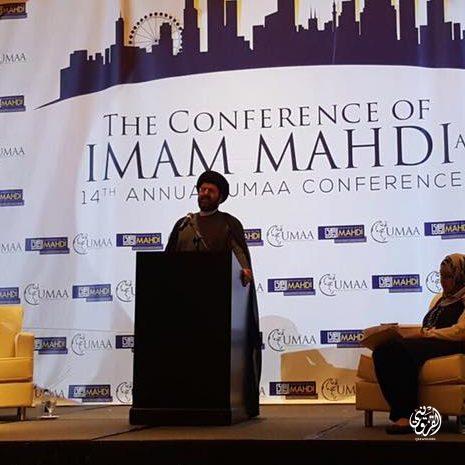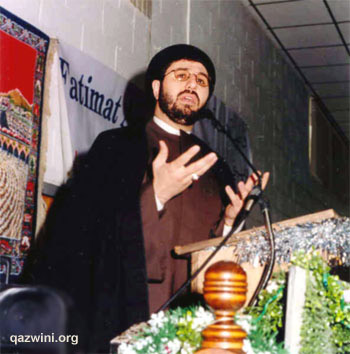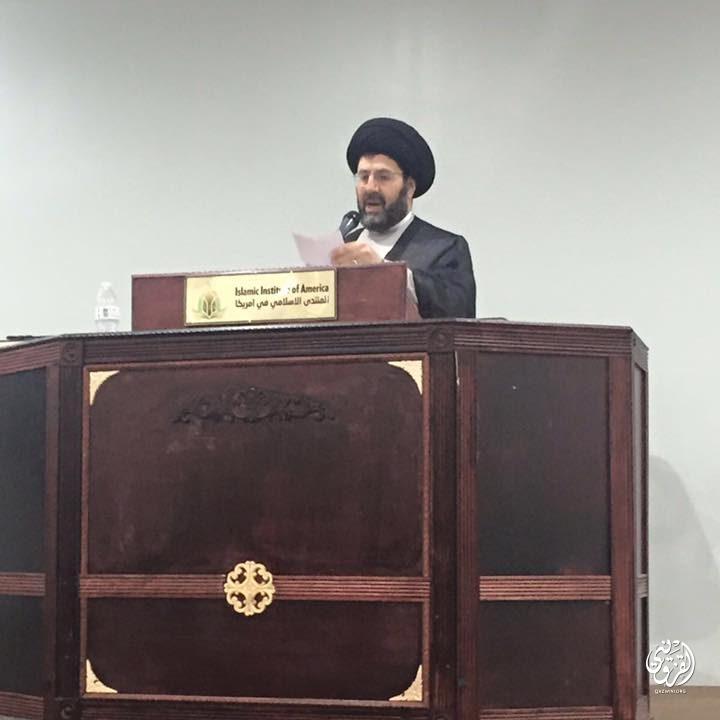Imam Sayed Hassan Al-Qazwini was born in the holy city of Karbala, Iraq in 1964. Karbala hosts the sanctified and sublime shrine of Prophet Muhammad’s [p] grandson, Imam Hussein [a]. Al-Qazwini’s family is well known in Iraq and the Muslim world at large for people of scholarship, leadership, and dedication to serving their Muslim community. With the advent of the despotic Ba’athist regime in the late 1960’s and early 1970’s, the Al-Qazwini family, along with other prominent scholars, multiplied its efforts by educating the masses to combat the depravity brought forth by the Ba’athists, for they gradually brainwashed the people of Iraq. Al-Qazwini’s father, Ayatollah Sayed Mortadha Al-Qazwini, was among the leading scholars in spreading the word of Islam in Iraq and engaging in Islamic activism. He helped establish several Islamic schools and institutions, and he served as the principal of Imam Assadiq Islamic School in Karbala.
After several years, Saddam Hussein perceived the Al-Qazwini family as an ideological threat to his regime. Thus, he started to pressure them to abandon their mission and to support his corrupt regime. In 1980, Sayed Hassan Al-Qazwini’s grandfather, Ayatollah Sayed Mohammad Sadiq Al-Qazwini, was arrested and imprisoned by Saddam Hussein simply because he did not support the Ba’athist regime. Amnesty International deemed him as the oldest political prisoner in the world at the time. Since then, the Al-Qazwini family never heard from him, and it was not until a few weeks after the collapse of Saddam’s regime that they found documents verifying his departure in Saddam’s prisons. Consequently, Al-Qazwini’s family was forced to flee Iraq and seek refuge in Kuwait.
In Kuwait, Sayed Hassan Al-Qazwini decided to pursue the path of his forefathers of becoming a scholar of Islam and religious leader. At that time, Saddam’s thirst for blood compelled him to penetrate and assail Kuwait. Therefore, at the inception of the Islamic Revolution in Iran, Al-Qazwini immigrated to Iran along with his family. In 1980, Al-Qazwini joined the Islamic Seminary in Qum, Iran, which is the largest Shi’a seminary in the world today. After twelve years of vigorous study and as a diligent seminarian, Al-Qazwini graduated in 1992 with a fine grasp of the fundamentals of Islamic jurisprudence and Quranic commentary. During his studies, he administered a prominent Islamic journal called “Annibras,” or The Eternal Light. The journal addressed many social, historical and Islamic issues. In addition, he authored two books: Meditation on Sahihain, a critique of Sahih Al-Bukhari and Sahih Muslim, and Prophet Mohammad: The Ethical Prospect.
Al-Qazwini’s father immigrated to the United States in 1986, where he eventually established several Islamic institutions and mosques. In 1994 he founded a full-time Islamic school which enrolled students from pre-kindergarten through twelfth grade. Realizing that there was a dire need for scholars and religious leaders in the United States, where Islam was in the crawling stage of development, Al-Qazwini immigrated to the United States in late 1992 along with his family. For some time, he directed Azzahra Islamic Center, which was founded by his father, in Los Angeles, California. In addition, he conducted several Islamic Fiqh and various other Islamic classes during his four-year span in Los Angeles.
In early 1993, Sayed Hassan Al-Qazwini was invited by the Islamic Center of America, in Detroit, to be the guest speaker for the Arabic program during the upcoming holy month of Ramadhan. Sayed Hassan Al-Qazwini’s visit to Detroit’s Islamic Center of America, the oldest Shi’a mosque in the United States, was a stepping stone for his future in America. The community in Dearborn, Michigan quickly found him responsive to their spiritual and religious needs, seeing him as being able to relate to them in a unique and effective manner. Thus, the community at large, especially the youth, became attached to him as their religious and spiritual guide. The Islamic Center of America asked Sayed Hassan Al-Qazwini to join them the following year as their guest speaker during the holy month of Ramadhan and the first ten days of Muharram, commemorating the martyrdom of the beloved grandson of Prophet Muhammad [peace be upon him and his progeny], Imam Hussein [a].
Prior to Sayed Hassan Al-Qazwini’s visit to Michigan, but especially after, he realized that the first step in disseminating the message of Islam in the greatest continent in the world would be to acquire a fair grasp of their language: English. In Michigan, he saw the greatest potential in the youth and the younger generations, and the only way to establish a good relationship with these groups and be able to communicate with them was to learn their language. There had been numerous scholars and religious leaders prior to Sayed Hassan Al-Qazwini who performed a good job in reaching out to the Arabic speaking members of the community, but seldom did the English speaking generations find someone who was capable of communicating with them successfully and eloquently and cater to their needs. Thus, upon this basis, Al-Qazwini committed and devoted himself to learning and acquiring a fair grasp of the English language quickly.
In 1997 Sayed Hassan Al-Qazwini established residence in Dearborn, Michigan, as the Islamic Center of America asked him to serve as a scholar and religious leader. Al-Qazwini conducts Friday Prayer every week. He delivers the first sermon in Arabic and the second in English, as a growing number of the younger English speaking generation is participating in religious events frequently. On Sunday mornings, he performs an English presentation during the Sunday service, usually aimed at addressing a sundry of current issues that affect the local Muslim community as well as the global community at large.
Realizing that the greatest energy and potential rested in the youth and the younger generations, Al-Qazwini founded the Young Muslim Association (YMA) in 1998. This organization, affiliated with the Islamic Center of America, is aimed at educating the Muslim American youth, fostering leadership amongst them, and creating an environment in which they can actively promote Islam and effectively channel their efforts. In about five years since its establishment, the YMA has grown to be one of the largest Muslim youth organizations in North America. The YMA annually holds a thirty-day program during Ramadhan and a ten-day commemoration of the grandson of Prophet Muhammad [p], Imam Hussein [a]. Furthermore, the YMA conducts an annual retreat during the summer, a Ramadhan dinner, Eid Al-Ghadeer dinner, which celebrates the day the Prophet [p] appointed his cousin and son-in-law Imam Ali [p] as his successor, and numerous other educational activities throughout the year.
Since the heinous attacks of September 11 when “the faith of Islam was hijacked,” as a rabbi put it, Al-Qazwini multiplied and accelerated his efforts to depict a genuine representation of Islam and Muslims. He has thus far spoken at over a hundred churches, colleges, and universities about the genuine and authentic teachings of Islam, thereby dispelling the common misconceptions about Muslims in America. As Congressman John D. Dingell put it at the 108th Congress session after Al-Qazwini offered the prayer for the opening session:
“Imam Qazwini has become a leading voice for Muslims in America. He has spoken movingly of the need for reconciliation, for tolerance, and for the recognition of our humanity. He has worked with leaders in both the Christian and Jewish communities to help bridge the differences between us and to dispel prejudice. His work has touched Muslim and non-Muslim alike, and his devotion to our State and our community of Dearborn has been recognized by the mayor, the governor, and by President Bush.”
Al-Qazwini has also effectively influenced numerous political leaders in America to cater to the Muslim communities. For instance, he has pressured the American leadership several times to speak out publicly against infamous religious leaders who have time and time again launched an attack against Islam and Prophet Muhammad [p]. The White House has invited Al-Qazwini on several occasions to represent the Muslim community. Al-Qazwini has met with President Clinton and President Bush to discuss issues pertaining to Muslim affairs. The State Department and Defense Department have also invited him. Al-Qazwini continues to be one of the most outspoken and influential Muslim Shi’a religious leaders in the United States. He has been outspoken on CNN, NPR, BBC, VOA, the New York Times, the Detroit News, the Detroit Free Press, and a wide range of many other media outlets. With the will of Allah [swt] and the efforts of His servants, Americans will have a clear and unadulterated picture of Islam. May the message of Islam reach every individual and may Allah [swt] guide all people to His right path.
After several years, Saddam Hussein perceived the Al-Qazwini family as an ideological threat to his regime. Thus, he started to pressure them to abandon their mission and to support his corrupt regime. In 1980, Sayed Hassan Al-Qazwini’s grandfather, Ayatollah Sayed Mohammad Sadiq Al-Qazwini, was arrested and imprisoned by Saddam Hussein simply because he did not support the Ba’athist regime. Amnesty International deemed him as the oldest political prisoner in the world at the time. Since then, the Al-Qazwini family never heard from him, and it was not until a few weeks after the collapse of Saddam’s regime that they found documents verifying his departure in Saddam’s prisons. Consequently, Al-Qazwini’s family was forced to flee Iraq and seek refuge in Kuwait.
In Kuwait, Sayed Hassan Al-Qazwini decided to pursue the path of his forefathers of becoming a scholar of Islam and religious leader. At that time, Saddam’s thirst for blood compelled him to penetrate and assail Kuwait. Therefore, at the inception of the Islamic Revolution in Iran, Al-Qazwini immigrated to Iran along with his family. In 1980, Al-Qazwini joined the Islamic Seminary in Qum, Iran, which is the largest Shi’a seminary in the world today. After twelve years of vigorous study and as a diligent seminarian, Al-Qazwini graduated in 1992 with a fine grasp of the fundamentals of Islamic jurisprudence and Quranic commentary. During his studies, he administered a prominent Islamic journal called “Annibras,” or The Eternal Light. The journal addressed many social, historical and Islamic issues. In addition, he authored two books: Meditation on Sahihain, a critique of Sahih Al-Bukhari and Sahih Muslim, and Prophet Mohammad: The Ethical Prospect.
Al-Qazwini’s father immigrated to the United States in 1986, where he eventually established several Islamic institutions and mosques. In 1994 he founded a full-time Islamic school which enrolled students from pre-kindergarten through twelfth grade. Realizing that there was a dire need for scholars and religious leaders in the United States, where Islam was in the crawling stage of development, Al-Qazwini immigrated to the United States in late 1992 along with his family. For some time, he directed Azzahra Islamic Center, which was founded by his father, in Los Angeles, California. In addition, he conducted several Islamic Fiqh and various other Islamic classes during his four-year span in Los Angeles.
In early 1993, Sayed Hassan Al-Qazwini was invited by the Islamic Center of America, in Detroit, to be the guest speaker for the Arabic program during the upcoming holy month of Ramadhan. Sayed Hassan Al-Qazwini’s visit to Detroit’s Islamic Center of America, the oldest Shi’a mosque in the United States, was a stepping stone for his future in America. The community in Dearborn, Michigan quickly found him responsive to their spiritual and religious needs, seeing him as being able to relate to them in a unique and effective manner. Thus, the community at large, especially the youth, became attached to him as their religious and spiritual guide. The Islamic Center of America asked Sayed Hassan Al-Qazwini to join them the following year as their guest speaker during the holy month of Ramadhan and the first ten days of Muharram, commemorating the martyrdom of the beloved grandson of Prophet Muhammad [peace be upon him and his progeny], Imam Hussein [a].
Prior to Sayed Hassan Al-Qazwini’s visit to Michigan, but especially after, he realized that the first step in disseminating the message of Islam in the greatest continent in the world would be to acquire a fair grasp of their language: English. In Michigan, he saw the greatest potential in the youth and the younger generations, and the only way to establish a good relationship with these groups and be able to communicate with them was to learn their language. There had been numerous scholars and religious leaders prior to Sayed Hassan Al-Qazwini who performed a good job in reaching out to the Arabic speaking members of the community, but seldom did the English speaking generations find someone who was capable of communicating with them successfully and eloquently and cater to their needs. Thus, upon this basis, Al-Qazwini committed and devoted himself to learning and acquiring a fair grasp of the English language quickly.
In 1997 Sayed Hassan Al-Qazwini established residence in Dearborn, Michigan, as the Islamic Center of America asked him to serve as a scholar and religious leader. Al-Qazwini conducts Friday Prayer every week. He delivers the first sermon in Arabic and the second in English, as a growing number of the younger English speaking generation is participating in religious events frequently. On Sunday mornings, he performs an English presentation during the Sunday service, usually aimed at addressing a sundry of current issues that affect the local Muslim community as well as the global community at large.
Realizing that the greatest energy and potential rested in the youth and the younger generations, Al-Qazwini founded the Young Muslim Association (YMA) in 1998. This organization, affiliated with the Islamic Center of America, is aimed at educating the Muslim American youth, fostering leadership amongst them, and creating an environment in which they can actively promote Islam and effectively channel their efforts. In about five years since its establishment, the YMA has grown to be one of the largest Muslim youth organizations in North America. The YMA annually holds a thirty-day program during Ramadhan and a ten-day commemoration of the grandson of Prophet Muhammad [p], Imam Hussein [a]. Furthermore, the YMA conducts an annual retreat during the summer, a Ramadhan dinner, Eid Al-Ghadeer dinner, which celebrates the day the Prophet [p] appointed his cousin and son-in-law Imam Ali [p] as his successor, and numerous other educational activities throughout the year.
Since the heinous attacks of September 11 when “the faith of Islam was hijacked,” as a rabbi put it, Al-Qazwini multiplied and accelerated his efforts to depict a genuine representation of Islam and Muslims. He has thus far spoken at over a hundred churches, colleges, and universities about the genuine and authentic teachings of Islam, thereby dispelling the common misconceptions about Muslims in America. As Congressman John D. Dingell put it at the 108th Congress session after Al-Qazwini offered the prayer for the opening session:
“Imam Qazwini has become a leading voice for Muslims in America. He has spoken movingly of the need for reconciliation, for tolerance, and for the recognition of our humanity. He has worked with leaders in both the Christian and Jewish communities to help bridge the differences between us and to dispel prejudice. His work has touched Muslim and non-Muslim alike, and his devotion to our State and our community of Dearborn has been recognized by the mayor, the governor, and by President Bush.”
Al-Qazwini has also effectively influenced numerous political leaders in America to cater to the Muslim communities. For instance, he has pressured the American leadership several times to speak out publicly against infamous religious leaders who have time and time again launched an attack against Islam and Prophet Muhammad [p]. The White House has invited Al-Qazwini on several occasions to represent the Muslim community. Al-Qazwini has met with President Clinton and President Bush to discuss issues pertaining to Muslim affairs. The State Department and Defense Department have also invited him. Al-Qazwini continues to be one of the most outspoken and influential Muslim Shi’a religious leaders in the United States. He has been outspoken on CNN, NPR, BBC, VOA, the New York Times, the Detroit News, the Detroit Free Press, and a wide range of many other media outlets. With the will of Allah [swt] and the efforts of His servants, Americans will have a clear and unadulterated picture of Islam. May the message of Islam reach every individual and may Allah [swt] guide all people to His right path.
